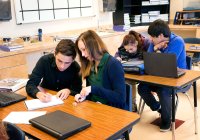Building Students’ Noncognitive Skills
Simple ways to encourage your students to develop academic mindset, metacognition, and social skills with your teaching.
Your content has been saved!
Go to My Saved Content.The emergence of smartphones and their apps has created a new world of personalization, instant results, and the ability to connect with others without actually making contact, but some of the basic foundational skills—perseverance, social skills, and more—that were once developed naturally have gone by the wayside.
Research on how these noncognitive factors affect learning is in its infancy, but preliminary findings point toward promising returns. Here I will examine noncognitive factors commonly lacking in today’s students and address how to develop these skills through specific (and easy to implement) instruction.
Academic Perseverance
This skill is best explained as the ability a student has to stick with a task, even when it is not a quick or easy one. One way to build this skill is to use learning scales, which are a convenient way to help students monitor their progress toward proficiency and eventually mastery of standards. Learning scales can be created by setting the standard you’re teaching at the proficiency mark (typically called level 3), then writing more simplified versions of the standard for levels 1 and 2, and a more intense version of the standard for level 4 (mastery). For high impact, couple scales with assignments that are designed to require repeated revision and provide students only with feedback on the revisions, not a grade. The final submission can be graded.
Another way to build academic perseverance is to use reflective journals with your students. Have them write about their level of understanding or points of confusion. You can incorporate this at the beginning of a lesson, several times throughout the lesson, and at the conclusion of the lesson. Allow students to read through their reflections at least once a week to see the progress they made simply by continuing to do their best.
Learning Strategies
These skills are just what the term says: strategies we use in order to learn. While your students are familiar with how to engage in all of the high-impact strategies you regularly use in your classroom, they are likely not aware of why you’re using those strategies. Be explicit about the why.
For example, when you introduce a new lesson with an activating strategy, tell your students about it: “We’re doing this because we need to connect what you already know to this new topic.” What you’re doing by being explicit is teaching students how to monitor their metacognition. Help them to keep tabs on their learning by asking them to be aware of how much they are paying attention to what they are hearing, or reading, or writing. Older students may benefit from a brief conversation about the difference between cognitive engagement (actually engaging with the content) and behavioral engagement (following directions and appearing to be on task, but not actually engaging in the work of thinking).
Asking your students to pay attention to their cognitive engagement can yield big returns. Likert scales are a way to measure whether an individual agrees with or disagrees with a particular statement or idea, and a simple Likert scale of faces with expressions ranging from a smile to a frown is an appropriate way to begin the monitoring process, and will encourage students to focus their attention on their learning. Older students can collect their data and begin to look for patterns. Challenge them to use data to identify points when they have difficulty engaging in work, and help them plan for how to make adjustments.
Social Skills
These foundational skills influence a student’s ability to communicate and work effectively with others. While this seems like something all students have mastered, it is often a skill set they need direct instruction in order to develop.
A good place to start is with setting norms for speaking and listening in your classroom. Ideally, you should involve your students in the norm-setting process, but some non-negotiables should be: When someone speaks, provide them with your full attention; only one person should speak at a time; and leave three seconds of quiet between when one person stops talking and the next person starts talking.
Often, students fall into the trap of halfheartedly listening to what others are saying because they’re busy planning their own response. Have them practice listening and replying to a partner with the opening line, “What I hear you saying is _____. I agree or disagree because _____.” This exercise is best done in pairs so that each student has a direct responsibility to a partner and there’s not an opportunity to not participate.
Academic Mindset
The work of Carol Dweck, the leading researcher on academic mindset, is readily available and provides excellent guidelines for helping students and teacher achieve an academic mindset.
Creating a classroom environment where students see the relevance of learning, and where they feel a sense of belonging, is an excellent way to foster an academic mindset in them. To complement Dweck’s ideas, consider implementing weekly goal writing with students. Anchoring back to the student’s individual goals and monitoring progress toward goals is an excellent way to help students focus on their academic growth.
Specific, meaningful feedback that is related to each student’s goals will help keep the focus on their progress. You may also consider having students lead their own student-parent conferences. This can be done at conference time or on a rotating biweekly basis. Instead of a teacher-based reporting system, have students report progress on their academic goals to their parents or guardians, either in person or via video conferencing. This provides students with a sense of ownership and the ability to identify their strengths and opportunities for growth.
